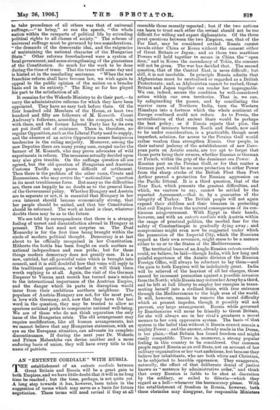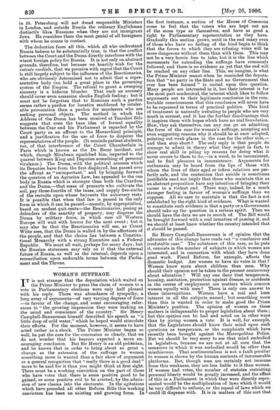AN "ENTENTE CORDIALE" WITH RUSSIA. T HE establishment of an entente
cordiale between Great Britain and Russia will be a great gain to both Empires, and we have little doubt that it will in no long time be reached ; but the time, perhaps, is not quite yet. A long step towards it has, however, been taken in the suggestion of terms which may serve as a basis for future negotiation. These terms will need revisal if they at all resemble those recently reported ; but if the two nations can learn to trust each other the revisal should not be too difficult for willing and expert diplomatists. Of the three great questions between the two Empires, one, that of the Far East, may be considered settled. Russia cannot invade either China or Korea without the consent either of Great Britain or Japan ; and as those two maritime Powers will hold together to secure in China the " open door," and in Korea the ascendency of Tokio, the consent will not be given. The war has decided that. The second question, that of the Central East, is more difficult; but still, it is not insoluble. In principle Russia admits that Afghanistan must be neutralised or regarded as a British Protectorate ; and, as Afghanistan cannot be rushed, Great Britain and Japan together can render her impregnable. We can, indeed, secure the condition by well-considered. action within our own territories. That is, we can, by safeguarding the passes, and by conciliating the warrior races of Northern India, turn the Western Himalaya into a fortress which the whole continent of Europe combined could not reduce. As to Persia, the neutralisation of that ancient State would. be perhaps the best policy ; or if Russia rejects that plan, the division of interests between North and South, now said to be under consideration, is a practicable, though most imperfect, solution, for access to the Persian Gulf would rather weaken than strengthen Russia. Our people, in their natural jealousy of the establishment of new Euro- pean ports on Asiatic coasts, are too apt to forget that those ports bring their owners, whether Russian or German or French, within the grip of the dominant sea Power. A Russian port on the Persian Gulf, or for that matter a. German port, would be no more protection to either Power from the sharp stroke of the British Fleet than Port Arthur proved a protection for Russian aggression on the Pacific littoral. It is a third question, that of the Near East, which presents the greatest difficulties, and which, we venture to say, cannot be settled by the reported Agreement,—that is, by a guarantee of the integrity of Turkey. The British people will not again expend their children and their treasure in protecting that evil Empire from the natural consequences of its con- tinuous misgovernment. With Egypt in their hands, however, and with an entente cordiale with Austria within the range of practical ,politics, the morbid fear for the safety of Constantinople is gradually dying away ; and compromises might even now be suggested under which the possession of the Imperial City, which the Russians regard as their own reversion, might cease to be a, menace either to us or to the States of the Mediterranean.
The territorial bases of an Anglo-Russian entente cordiale could, we believe, be laid—though India, with her long and painful experience of the Asiatic division of the Russian Foreign Office, will always be reluctant to lay them—and the gain to both Empires will be indefinitely great. India will be relieved of the heaviest of all her charges, those caused by incessant precaution against a possible invasion from the North; while Russia may reduce her Army by a third, and be left at full liberty to employ her energies in trans- muting herself into a civilised State, with free entrance through the Mediterranean to the high seas of the world. It will, however, remain to remove the moral difficulty which at present impedes, though it possibly will not prevent, any large arrangement. Russia while governed by Reactionaries will never be friendly to Great Britain, for she will always see in her rival's greatness a moral menace to her own oppressive system. The basis of that system is the belief that without it Russia cannot remain a mighty Power ; and the answer, already made in the Duma; is too plain,—that Britain has found freedom and might easily compatible. There is, moreover, a strong popular feeling in this country to be considered. Our common people regard Russia as an evil State, not on account of her military organisation or her vast ambitions, but because they believe her inhabitants, who are both white and Christian, to be subjected to horrible oppression. They exaggerate, naturally, the effect of that deliberate denial of justice known as " sentence by administrative order," and think that every Russian is liable to be shot at. discretion by the soldiery, or exiled to Siberia—which they regard as a hell—whenever the bureaucracy please. With the establishment of freedom in Russia, however, both these obstacles may disappear, for responsible Ministers in St. Petersburg will not dread responsible Ministers in London, and outside Russia the ordinary Englishman distinctly likes Russians when they are not immigrant Jews. He considers them the most genial of all foreigners with whom he comes in contact.
The deduction from all this, which all who understand Russia believe to be substantially true, is that the conflict between the Court and the Duma directly interferes with the wisest foreign policy for Russia. It is not only on abstract grounds, therefore, but because we heartily wish for the entente cordiale, that we perceive with regret that the Court is still largely subject to the influence of the Reactionaries, who are obviously determined not to admit that a repre- sentative body can hold a great place in the governing system of the Empire. The refusal to grant a sweeping amnesty is a hideous blunder. That such an amnesty should cover even assassins shocks English feeling ; but it must not be forgotten that to Russians such a pardon seems rather a pardon for lunatics maddened by intoler- able provocation than a pardon for murderers who are seeking personal objects. The method in which the Address of the Duma has been received at Tsarskoe Selo suggests that even the bare idea of formal equality between the Czar and his Parliament is regarded by the Court party as an affront to the Monarchical principle, and a justification for the use of force to disperse the representatives of the people. (It reminds patient students, too, of that interference of the Court Chamberlain in Paris which is known as the De Breze incident, and which, though Mirabeau squelched him, imparted to the quarrel between King and Deputies something of personal virulence.) The Duma, with the political acumen which its Deputies have from the first displayed, has passed over the affront as " unimportant," and by bringing forward the question of an Agrarian Law, has appealed to the one body in Russia which is stronger than both the Czardom and the Duma,—that mass of peasants who cultivate the soil, pay three-fourths of the taxes, and supply five-sixths of the recruits upon whose bayonets the autocracy rests. It is possible that when that law is passed in the only form in which it can be passed—namely, by expropriation, based on modest quit-rents—the Reactionaries, posing as defenders of the sanctity of property, may disperse the Duma by military force, in which case all Western Europe will wait with horror for the next event ; but it may also be that the Reactionaries will see, as Count Witte sees, that the Duma is walled in by the affections of the people, and that the choice lies between a Constitu- tional Monarchy with a strong Executive and a Federal Republic. We must all wait, perhaps for many days ; but the Russian statesmen may rely on it that the external future of Russia, as well as the internal, depends upon a reconciliation upon endurable terms between the Parlia- ment and the Throne.











































 Previous page
Previous page